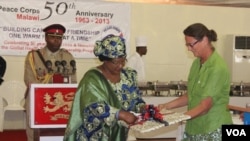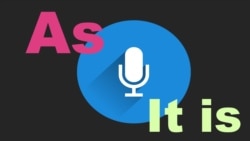Hello there! I’m June Simms and this is As It Is, from VOA Learning English.
Several leading democracy groups in the United States are celebrating 30 years of service. Their work to increase democracy around the world has not been easy. But, these groups say this work has paid off. Mario Ritter will have more on that later in the show.
Peace Corps Among JFK’s Lasting Achievements
But first, Friday, November 22nd, marked the 50th anniversary of the murder of President John F. Kennedy in Dallas, Texas. The anniversary has raised discussion and reflection about the former president’s achievements while in office. One of his more notable successes was the creation of the Peace Corps, a volunteer force of mainly young Americans who have served in developing nations for more than 50 years.
“Ask not what your country can do for you. Ask what you can do for your country.”
That was President Kennedy’s famous call to service during his Inaugural Address on January 20, 1961. That call to action marked the beginning of the Peace Corps.
The idea for the Peace Corps came during a late-night campaign stop at the University of Michigan in October of 1960. John F. Kennedy was a senator at the time. He urged students to serve their country by helping to improve conditions in other countries.
Young Americans quickly grabbed hold of the idea of delaying their own careers to live and work in developing nations.
Harris Wofford served as an advisor to the new president. He says creating the Peace Corps was one of President Kennedy’s main goals when he entered office.
“Kennedy wanted action. He wanted us to move and we had the plan of the Peace Corps within the first six weeks.”
Kennedy invited the first group of volunteers to a gathering at the White House before they left for Africa.
“The fact that you are willing to do this for our country and in the larger sense, as the name suggests, for the cause of peace and understanding, I think should make all Americans proud and make them all appreciative.”
Those early volunteers entered the Peace Corps with a sense of excitement and purpose. Barbara Kamara was one of them.
“Going to Liberia as a Peace Corps volunteer was a life-changing experience. I learned that I could just endure, that you start something and no matter what the challenges were to do it, that I could keep doing it until it was completed.”
Fifty years later, what remains is a sense of pride and accomplishment.
“When I look back on the great things that Peace Corps volunteers did, the many lives they impacted. I mean, the vice president of Liberia today gives tribute to his Peace Corps teacher contributing to his ability now to serve in that position as vice president.”
Harris Wofford says the creation of the Peace Corps remains an important part of President John F. Kennedy’s history.
“Around the world, people thought, here is the America we’ve been believing in or hoping for, young, optimistic, can-do. That’s the America that we’ve read about, we’ve thought about, we’ve hoped for, and here he was bringing it about.”
Since 1961, more than 200-thousand Americans have served in the Peace Corps in 139 host countries around the world. Volunteers must be citizens of the United States and they must be at least 18 years old to join. Education represents 43 percent of the work that the Peace Corps does. Health and community economic development are two other main areas of service.
You are listening to As It Is, from VOA Learning English. I’m June Simms in Washington.
U.S. Democracy Groups Mark 30 Years of Service
Many areas of the world are more democratic today than they were 30 years ago. That is partly because of the work of several organizations based in the United States, including the National Endowment for Democracy, or NED. This private, nonprofit group, which receives funds from Congress, is celebrating its 30th anniversary this year. Mario Ritter reports.
The NED’s longtime president, Carl Gershman, has helped spread democracy around the world.
“Our job, our responsibility, our mission, given by the Congress, is to be helpful, is to lend a helping hand. That's what we do. But the main driving forces are inside those countries, and it's basically the people in those countries.”
The NED is one of several pro-democracy groups celebrating 30 years of service. The National Democratic Institute and the International Republican Institute have similar operations.
The groups work with non-governmental organizations, political parties, democracy activists and some governments to help establish and strengthen democratic institutions. The NED does so by providing financial support to those groups. The party-backed groups are field-based, operating their own offices in the countries. Ken Wollack is president of the National Democratic Institute.
“In most all of those countries, we work with the ruling party, the opposition party, we work with the government, we work with civil society.”
However, field-based groups sometimes face opposition from the governments in the countries where they work.
The Republican IRI and the Democratic NDI left Russia last year under pressure from President Vladimir Putin's government.
Melinda Haring was an NDI program officer in Azerbaijan and is now with the Foreign Policy Research Institute. She says democratic aid operations should work only in countries that are partly free.
“When you're in a place like Kazakhstan or Uzbekistan or Azerbaijan or even Russia, you have to pay the piper. You can't implement programs that really challenge the regime.”
However, Ken Wollack notes numerous successes in which his agency has been involved. He says they include this year's elections in Kenya, which were far more peaceful than earlier votes.
“And a lot of effort was made in promoting dialogue between political parties, dialogue between the election authorities and parties, engaging youth constructively in the political process.”
NED president Carl Gershman admitted that democracy often is slow to take root, but it has global demand.
“Even in difficult countries like Saudi Arabia, or in North Korea, there are people, even there, who are trying to take the next step toward democracy. Over time, given enough time, I do think it's inevitable.”
And for 30 years, these United States democracy groups have been making progress, one country at a time. I’m Mario Ritter.
And that is As It Is, from VOA Learning English. Thank you for listening. For questions or comments about our show, email us at learningenglish@voanews.com. I’m June Simms.
Enjoy the rest of your day!
We are sorry, but this feature is currently not available






